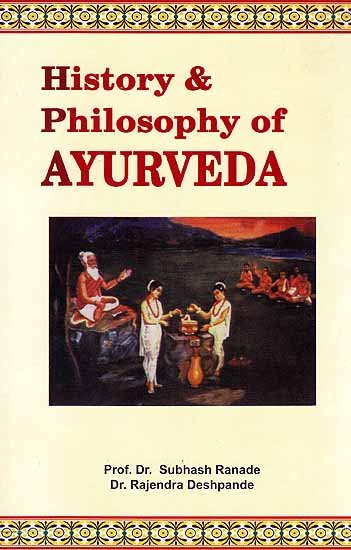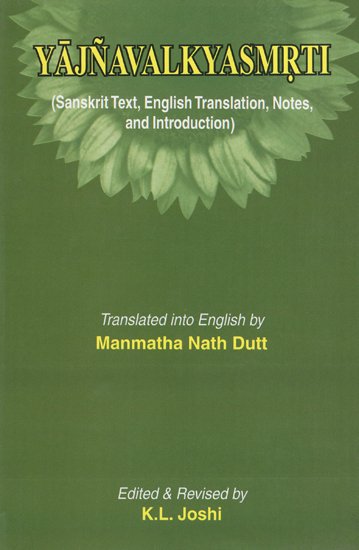Yajnavalkya Smrti
Original price was: ₹600.00.₹540.00Current price is: ₹540.00.
Sanskrit Text, Transliteration, and English Translation
| Author-Editor/लेखक-संपादक | B.S. Bist |
| Language/भाषा | Sanskrit Text, Transliteration, and English Translation |
| Edition/संस्करण | 2004 |
| Publisher/प्रकाशक | Chaukhamba Sanskrit Pratishthan |
| Pages/पृष्ठ | 355 |
| Binding Style/बंधन शैली | Hard Cover |
| ISBN | 8170842730 |

Thus this Smrti contains a key to refresh in mind the rules for human beings gradually developed from the stage of Homo sapiens to this modern civilized era.
It is prayed for the sake of humanity as a whole that every man should keep and peruse such treaties or books to feel adopt and realize these rules all benevolent for universal brotherhood i.e. Udara cartanam to vasudhaiva Kutumbakan. A practical approach toward these rules as described under three divisions will definitely act as a torch in hand especially and save humanity from falling into the blind alley of misconception misdirection misfeasance as prevailed in this ultra-modern world or a world of mere materialistic approach. In brief, rules may lead the life of a man from hell to heaven.
Every care has been exercised while conveying the true sense embedded in respective hymns all over the treaty still for the error/omission if any arise observed outright suggestions are solicited from the genius readers.
Right, from the oldest scripture till Yajnavalkya Smrti Yajnavalkya is known to be a great personality. It is also a fact that there were many seers known by the name of Yajnavalkya.
One Yajnavalkya was born in the family of Visvamitra and one in the family of Vasistha. According to Matsya Purana, he was known by the name of Yajnadatta. Yajnavalkya was also an acarya the disciple of Vaskala rsi Vayu Purana says that it is due to his name only that Rka Sisya tradition of Vyasa was known as Yajnavalkya.
Yajnavalkya is the name of Acarya. It is said that in his asrama thus lived a Brahmana named Visnuyasas. It is predicted there that the eleventh incarnation of Lord Visnu is Kalki will be born in his house.
According to Mahabharata Yajnavalkya is one of the sons of Visvamitra. His sons were learned and were known to be Brahmavdin. Another Yajnavalkya is one who is known to be a very learned scholar expert in Vedic loremaster in Dharmasastra and writer of many ancient books.
R.C. Majumdar says that Satapatha Brahmana a book belonging to Sukla Yajurveda is written by Yajnavalkya. At the end of Satapatha Brahmana, it is mentioned that Vajasaneya Yajnavalkya promulgated the bright Yajus received from the sun Satapatha Brahmana is an important source of information about the sacrificial ceremonies theology and philosophy of ancient India. It holds that Yajnavalkya received the formula of Sukla Yajurveda from Sun. Yahnavalkya Smriti clearly says that he was the author of Brhadaranyaka that he received from the sun and he also composed Yogasastra.
Bhadarapyakopanisad is a part of satapatha Brahmana. This shows that he was the author of Satapatha Brahmana. Yajnavalkyakanda of the Brhadaranyakopanisad is a proof of his intimate relationship with Satapatha Brahmana and Brhadaranyakopanisad.
Yajnavalkya is known to be a great philosopher and spiritual teacher. He knew things very minutely. Once Janak asked Yajnavalkya if he knew Agnihotra he replied that it is Payas. If Payas is not there then how to offer Agnihotra? asked Janak. Yajnavalkya told him various options. In the end, he said if nothing is available then one can offer. Satya in Sraddha. And Janaka had to say Yajnavalkya you know Agnihotra. For this, he was given a hundred cows.’
Yajnavalkya had two wives Katyayani and Maitreya. He taught the doctrine of Brahma and immortality to Maitreyi. In these chapters of Brhadaranyakopanisad. we find that Yajnavalkya had philosophical discussions with any of the scholars like Janaka, Avala. Aryabhata. Bhujyu. Kohala, Gargi. Aruni and Sakalya.
According to Brhadäranyakopanisad (6.3.15). Uddalaka Arupi was the Guru of Yajnavalkya. He is known to be an inhabitant of Videha because of his relations with Janaka. Satapatha Brahmana (XIV.9.4.29) gives a list of Acaryas. Yajnavalkya is forty-fifth on the list. Here also Aruni is said to be his Guru. As regards the time of Yajnavalkya he seems to be born before Pini. He belonged to the time of later Samhitas and Brahmanas.
| Preface | v | |
| Introduction | vii | |
|
Part One |
||
| 1. | The Source of Common Behaviours | 3 |
| 2. | Bachelorhood or Life of Celibacy | 7 |
| 3. | Marriage | 20 |
| 4. | Class and Caste Consciousness | 33 |
| 5. | Rules for Householder | 36 |
| 6. | Rules for an Initiated Householder | 47 |
| 7. | Estable and Non-eatable Food | 58 |
| 8. | Purification of Matters (Articles) | 62 |
| 9. | Munificence or Gift | 67 |
| 10. | Oblation to the Manes | 72 |
| 11. | Ordinance of Lord Ganapati | 87 |
| 12. | Propitiations of Planets | 93 |
| 13. | Duties of the King | 98 |
| Part Two Vyavaharadhyayah (A Section on Behaviour) |
||
| 1. | The Source of Common Behaviours | 115 |
| 2. | The Source of Uncommon Behaviours | 118 |
| 3. | Lending | 127 |
| 4. | Sealed Deposits | 137 |
| 5. | Witness | 139 |
| 6. | Written Document | 143 |
| 7. | Divine Oaths | 146 |
| 8. | Coparcenary Shares | 151 |
| 9. | Boundary Disputes | 162 |
| 10. | Disputes Between Proprietor and Herdsman | 165 |
| 11. | Non-Proprietary Sale | 168 |
| 12. | Resumption of Gifts | 170 |
| 13. | Disputes regarding Rescission of Purchase | 171 |
| 14. | Breach of Service Contracts | 173 |
| 15. | Violation of a Contracts | 175 |
| 16. | Non-Payment of Wages | 178 |
| 17. | Rules for Calling out Gambling | 180 |
| 18. | Reproachful Speech | 182 |
| 19. | Assault or Violence | 185 |
| 20. | Robbery | 190 |
| 21. | Non-delivery after Sale | 196 |
| 22. | Trading in Partnership | 198 |
| 23. | Theft | 200 |
| 24. | Adultery with Women | 205 |
| 25. | Miscellaneous Disputes | 209 |
| Part Three Prayascittadhyayah (A Section on Atonement) |
||
| 1. | Impurity | 215 |
| 2. | Unspecified Customary Procedures (in Exigency or Calamity) | 224 |
| 3. | The religion of a Hermit | 227 |
| 4. | The Duties of an Ascetic | 230 |
| 5. | Atonement | 267 |
| Index of slokas | 301 | |
Only logged in customers who have purchased this product may leave a review.






Reviews
There are no reviews yet.